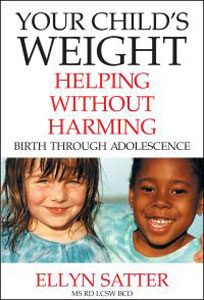

Family Meals Focus
The Ellyn Satter Institute Newsletter
Overweight kids are not gluttons
by Ellyn Satter, Registered Dietitian and Family Therapist
Children eat too much and get too fat because they don’t get enough support for their eating, their food intake is restricted, or both. Then, when children are unsupervised, restricted and therefore hungry children children eat as much as they can of whatever is available. In order for children of any size to a do a good job with food regulation, parents must follow the division of responsibility in feeding: They must do the what when and where of feeding and let their child to the whether and how much of eating.
Research fails to consider parent-child feeding relationship
According to media reports, the way to keep children from being fat is banning fat friends from eating together. Participants eating with a friend ate substantially more than did participants eating with an unfamiliar peer. Moreover, overweight youth who ate with an overweight partner (friend or unfamiliar peer) consumed more food than did overweight participants who ate with a non-overweight eating partner.1
In my view, it is unethical to address children’s eating behavior without considering feeding dynamics. Authors failed to take into account the context of the children’s observed eating behavior: the feeding relationship between them and their parents. Being perceived as obese, children likely had been fed in a restrained fashion. As a consequence, they are afraid of going hungry, food-preoccupied, and therefore likely overeat when they can. That is, when they get out from under conditions of restraint, they are likely to eat more. Eating with a lean child apparently replicates the same restraint conditions they experience with their parents; eating with another fat child does not.
Trait or state?
Any research that purports to address children’s eating behavior without considering feeding dynamics is unethical.
Many researchers make the same error, and ascribe flawed food-selection and food-consumption traits to overweight children when, in reality, the flaw springs from state: from interactions in the environment. Consider this research that finds children of overweight mothers, and/or children with a higher percentage of body fat, to have greater preference for fat,2 and this research finds children with higher weight status to regulate energy intake less precisely.3 If you stop there with the authors’ interpretations of the studies, the inevitable conclusion is that fat children are gluttons. However, in the first study,2 mothers’ fatness and their own dietary restraint strongly correlated with children’s fat preference and fat intake. Mothers and children restrained and together. In the second study,3 mothers who were more controlling of their children’s food intake had children who showed less ability to self-regulate energy intake. In both studies, distorted feeding dynamics was the confounding factor.
It’s all in the way you ask the question.
Salvy, et al’s premise was that there is something inherently abnormal about overweight children’s eating that makes them fat. Let’s lay out the premise about overweight children from the feeding dynamics perspective: It is normal for children to eat the amount of food they need to grow in a way that is constitutionally appropriate for them. If they do not, why not? What is interfering with the child’s natural ability?
Framing the question from the perspective of feeding dynamics refocuses from trait to state. In most cases, children’s inability to regulate food intake has to do with distortion in the feeding relationship: Parents fail to do their jobs with the what when and where of feeding and/or they intrude on the child’s prerogative with eating, with choosing whether or how much to eat. Children whose eating is managed by others lose the ability to do so themselves.
References
- Salvy SJ, Howard M, Read M, Mele E. The presence of friends increases food intake in youth. Am J Clin Nutr. 2009;90:282-7.
- Fisher JO, Birch LL. Fat preferences and fat consumption of 3 to 5-year-old children are related to parental adiposity. J Am Diet Assoc.1995;95:759-764.
- Johnson SL, Birch LL. Parents’ and children’s adiposity and eating style. Pediatrics. 1994;94:653-661.
Explore
For help with raising your big child or your small child to feel good about himself and have the body that is right for him, read Ellyn Satter's Your Child’s Weight: Helping Without Harming
Satter’s Division of Responsibility in Feeding addresses child obesity
- To prevent child overweight and obesity from birth, support parents in following sDOR.
- To treat child overweight and obesity at any age, restore sDOR and trust the child’s own homeostasis to restore appropriate growth.
Related issues of Family Meals Focus
- Child overweight: are current guidelines helpful? do they do harm?
- Children who are obsessed with food
- Court-ordered placement for child obesity: what can you do to help?
- Dieting and mental health
- Do children lose the ability to self-regulate?
- Food restriction in disguise
- Helping without harming with child overweight
- Managing “junk” food AKA sweet, chips, sodas
- Moves and counter-moves with feeding your child
- School nutrition horror stories
- Schools are not weight-loss camps
- Should you control portion sizes?
- Sticky topic of Halloween candy
- Vegetable agenda: Getting children to eat “nutritious” food

